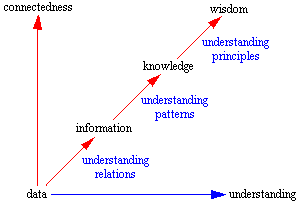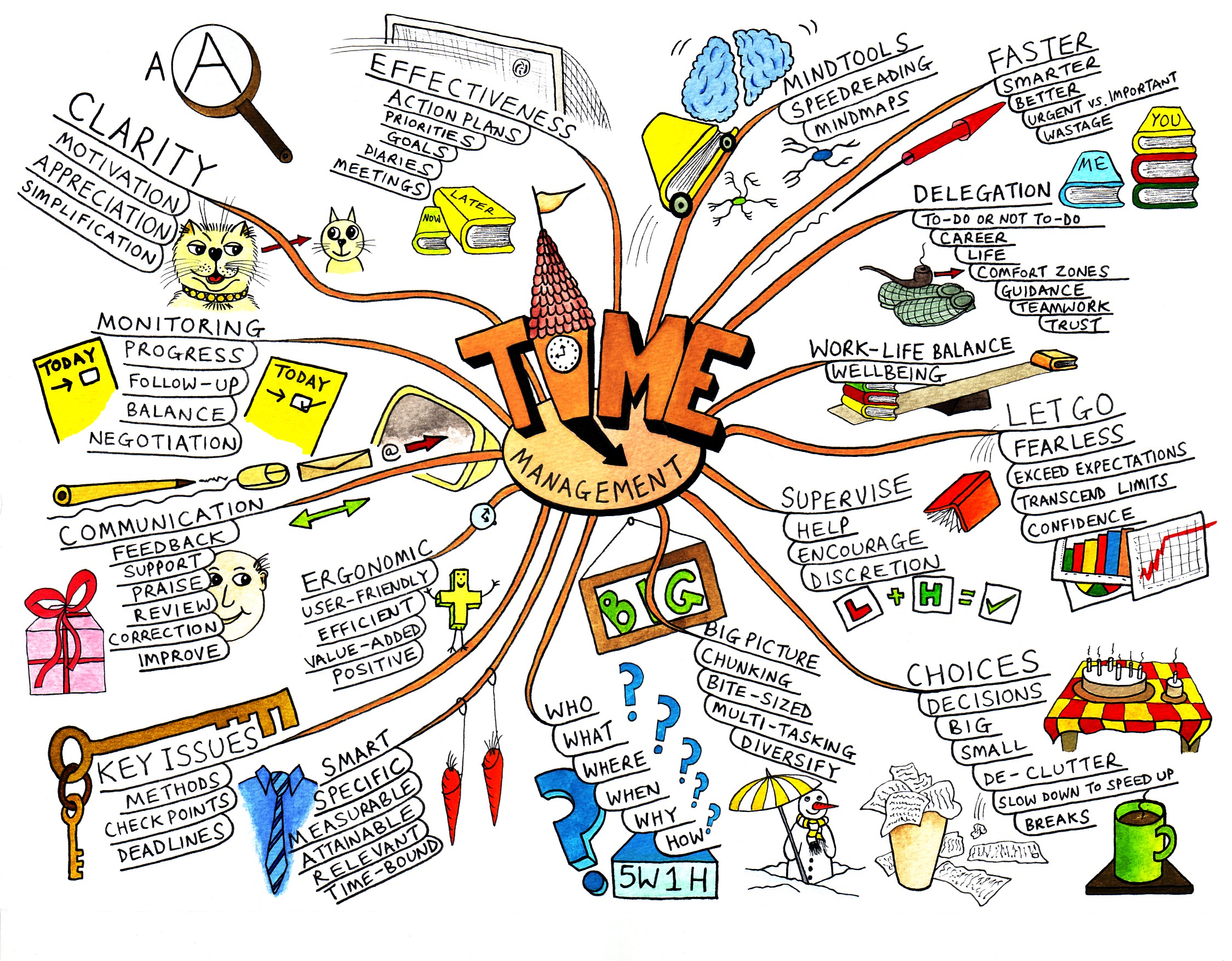Data
- information, often in the form of facts or figures obtained from experiments or surveys, used as a basis for making calculations or drawing conclusions
- information, for example, numbers, text, images, and sounds, in a form that is suitable for storage in or processing by a computer
Information
- definite knowledge acquired or supplied about something or somebody
- the collected facts and data about a particular subject
- a telephone service that supplies telephone numbers to the public on request.
- the communication of facts and knowledge
- computer data that has been organized and presented in a systematic fashion to clarify the underlying meaning
- a formal accusation of a crime brought by a prosecutor, as opposed to an indictment brought by a grand jury
Knowledge
- general awareness or possession of information, facts, ideas, truths, or principles
- clear awareness or explicit information, for example, of a situation or fact
- all the information, facts, truths, and principles learned throughout time
- familiarity or understanding gained through experience or study
Wisdom
- the knowledge and experience needed to make sensible decisions and judgments, or the good sense shown by the decisions and judgments made
- accumulated knowledge of life or in a particular sphere of activity that has been gained through experience
- an opinion that almost everyone seems to share or express
- ancient teachings or sayings
Good and poor information
Good information is that which is used
and which creates value. Experience and research shows that good
information has numerous qualities.
Good information is relevant for
its purpose, sufficiently accurate for its purpose, complete enough for
the problem, reliable and targeted to the right person. It is also
communicated in time for its purpose, contains the right level of detail
and is communicated by an appropriate channel, i.e. one that is
understandable to the user.
Poor information is irrelevant, swamping,
unclear, not all threw. Because if you are have all of this in your
information you may not make audience understand your information.
Source of information
"Source" means the origin of something. An information source is a source of information
for somebody, i.e. anything that might inform a person about something
or provide knowledge to somebody. Information sources may be
observations, people, speeches, documents, pictures, organizations etc.
They may be primary sources, secondary sources, tertiary sources and so on. Empiricism regards sense data as the ultimate information sources, while other epistemologies have different views
Primary sources
Primary sources allow researchers to get as close as
possible to original ideas, events and empirical studies as possible.
Such sources may include expositions of creative ideas, first hand or
contemporary accounts of events, publication of the results of empirical
observations or studies, and other items that may form the basis of
further research. Examples include:
|
|
Secondary sources
Secondary sources analyze, review or restate information in
primary resources or other secondary resources. Even sources presenting
facts or descriptions about events are secondary unless they are based
on direct participation or observation. Moreover, secondary sources
often rely on other secondary sources and standard disciplinary methods
to reach results, and they provide the principle sources of analysis
about primary sources. Examples include:
|
|
Tertiary sources
Tertiary resources provide overviews of topics by
synthesizing information gathered from other resources. Tertiary
resources often provide data in a convenient form or provide information
with context by which to interpret it. Examples include:
|
Information Literacy
The term information literacy, sometimes referred to as information competency, is generally defined as the ability to access, evaluate, organize, and use information from a variety of sources. Being information literate requires knowing how to clearly define a subject or area of investigation; select the appropriate terminology that expresses the concept or subject under investigation; formulate a search strategy that takes into consideration different sources of information and the variable ways that information is organized; analyze the data collected for value, relevancy, quality, and suitability; and subsequently turn information into knowledge (ALA 1989). This involves a deeper understanding of how and where to find information, the ability to judge whether that information is meaningful, and ultimately, how best that information can be incorporated to address the problem or issue at hand.
Information literacy requires an awareness of the way in which information systems work, of the dynamic link between a particular information need and the sources and channels required to satisfy that need (Darch et al. 1997).
Information overload
Information overload is a description given to the phenomenon where so much information is taken in by the human brain that it becomes nearly impossible to process it. Alvin Toffler, an academic from Russia, is credited with coining the term. Since the term was first used, it has become very popular, especially in the computer age, though some say information overload is more a time and presentation issue, than an actual data issue.
The reason that concerns about information overload have become so prevalent in today's world is explained by the complexities of the communications systems available to human beings. Instant communication is available by e-mail, cell phones, text messaging, instant messaging. Added to that, are the thousands of academic journals on the Internet, and even more information freely distributed through blogs and amateur Web sites. When all that is considered, information is being exchanged at rates never before experienced.
Further, when considering these sources, much of the information being presented may not be original. As a result, many times the reader or viewer will spend time going over information already received from other sources. If there are discrepancies, or even small differences in the way the information is presented, this could create confusion, leading an individual to feel overwhelmed. This is a common symptom blamed on information overload.
Value of information
The relative importance of
information for decision-making can increase or decrease its value to an
organisation. For example, an organisation requires information on a
competitor’s performance that is critical to their own decision on
whether to invest in new machinery for their factory. The value of this
information would be high. Always keep in mind that information should
be available on time, within cost constraints and be legally obtained.
Users of information
There are
many kinds of information users in the modern word, not just personal users.
They include users in...
- Business and industry
- Research and development
- Entertainment
What is mind map?
A mind map is a diagram used to represent words, ideas, tasks, or other items linked to and arranged around a central key word or idea. Mind maps are used to generate, visualize, structure, and classify ideas, and as an aid to studying and organizing information, solving problems, making decisions, and writing.
The elements of a given mind map are arranged intuitively according to the importance of the concepts, and are classified into groupings, branches, or areas, with the goal of representing semantic or other connections between portions of information. Mind maps may also aid recall of existing memories.
By presenting ideas in a radial, graphical, non-linear manner, mind maps encourage a brainstorming approach to planning and organizational tasks. Though the branches of a mindmap represent hierarchical tree structures, their radial arrangement disrupts the prioritizing of concepts typically associated with hierarchies presented with more linear visual cues.This orientation towards brainstorming encourages users to enumerate and connect concepts without a tendency to begin within a particular conceptual framework.
The mind map can be contrasted with the similar idea of concept mapping. The former is based on radial hierarchies and tree structures denoting relationships with a central governing concept, whereas concept maps are based on connections between concepts in more diverse patterns.
Source :
http://www.systems-thinking.org/dikw/dikw.htm
http://www.jhigh.co.uk/Intermediate2/Using%20Information/12_charact_of_info.html
http://en.wikipedia.org/wiki/Information_source
http://www.libraryinstruction.com/infolit.html
http://www.wisegeek.com/what-is-information-overload.htm
http://en.wikipedia.org/wiki/Mind_map



Data service is business increment process
ตอบลบservice. We get and make business growth in
market According to this blog there have good
and more valuable information about Data
services in uk. so thanks for posting this
type of blog today .
Thanks & Regards
Data Supply Services